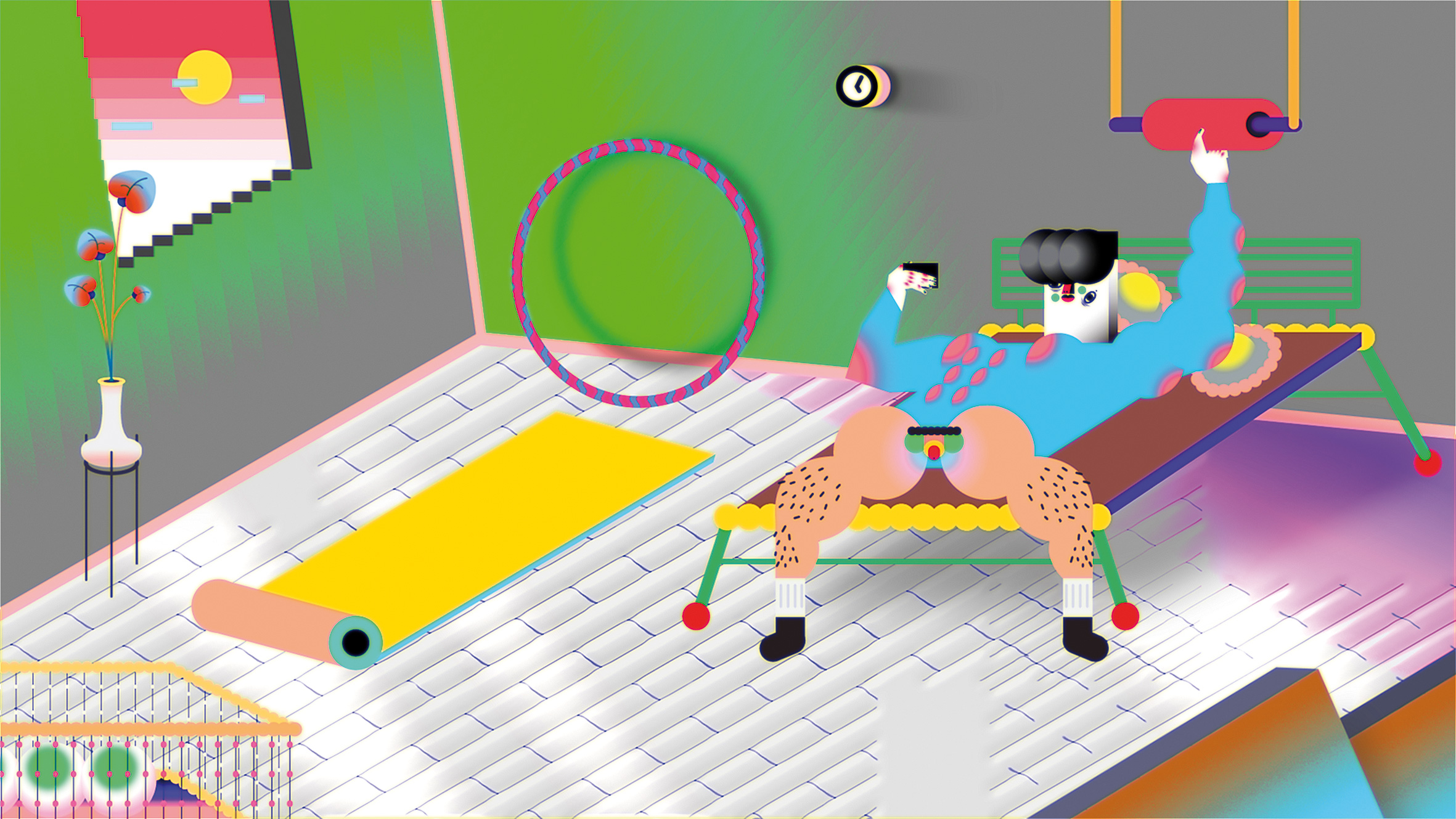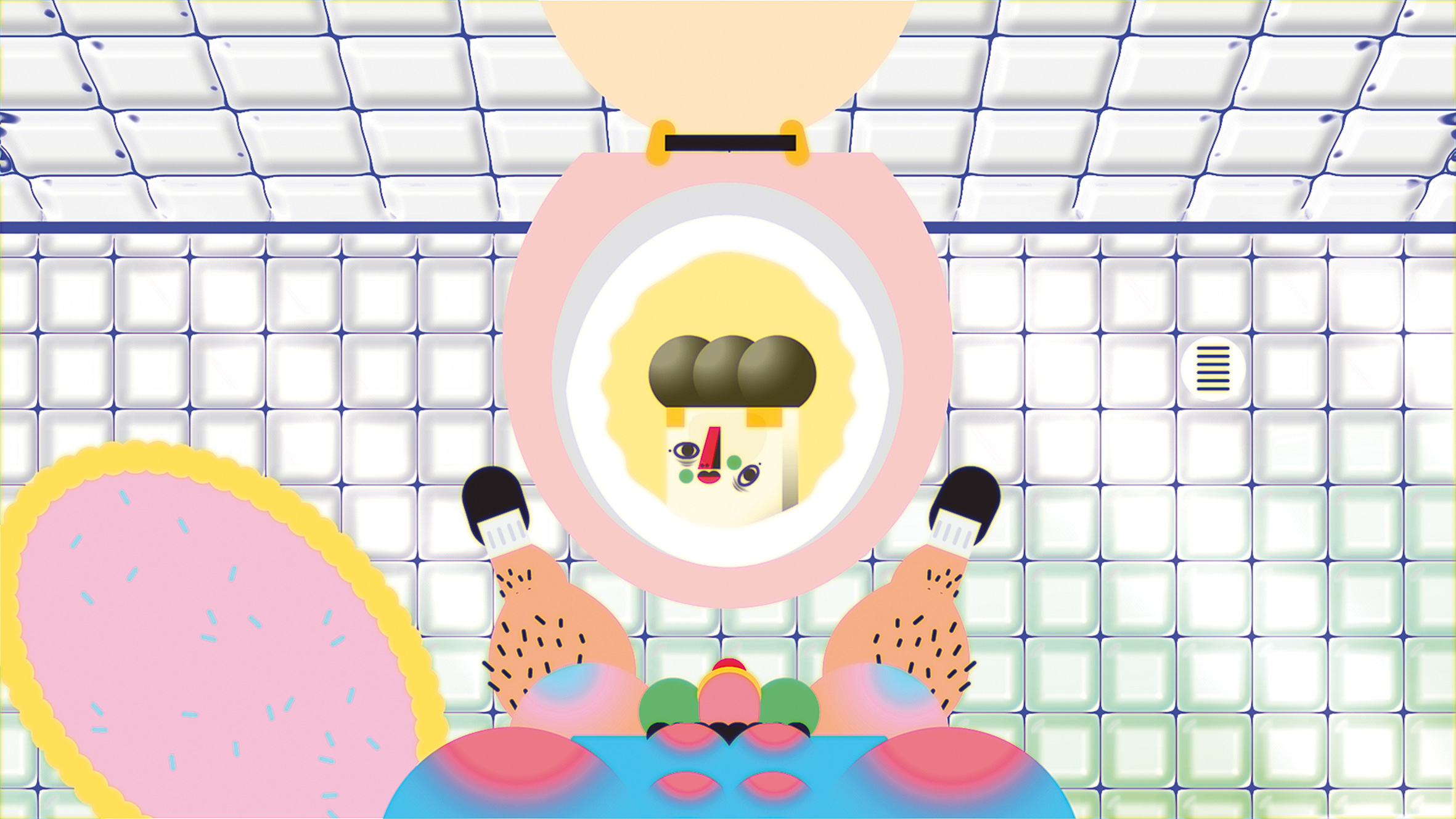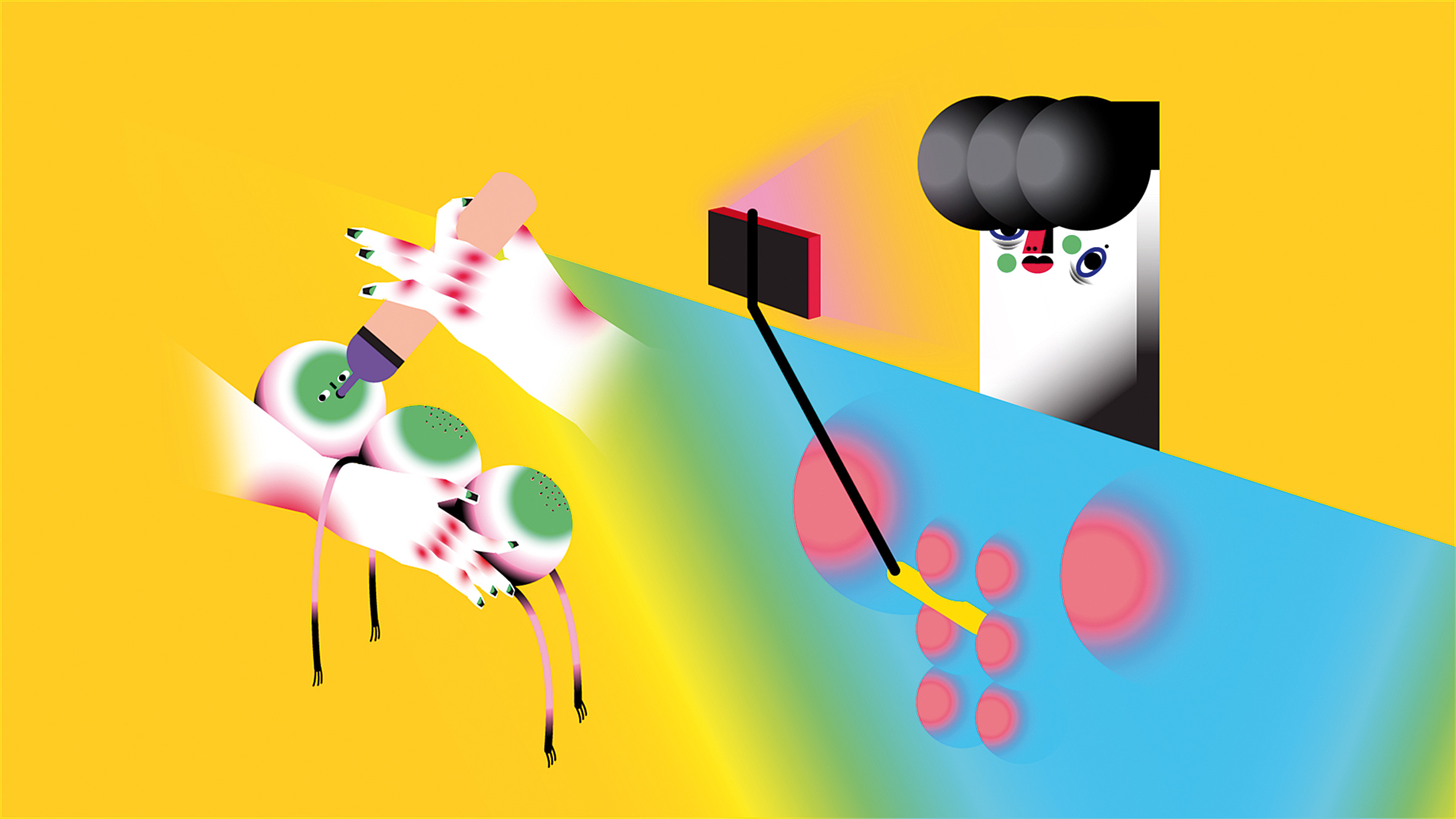“Sex,” writes the American philosopher, feminist, and film theorist Joan Copjec, “is the structural failure of language itself.” “Sex,” says Wong Ping, “is the language, not the message of my work.”
The longer you spend with Wong Ping’s five-minute, garishly colored clips in 1980s aesthetic (more than a dozen of them in the meantime), and the installations that have emerged from them, the more it becomes clear that they are about more than humorous figures, as Wong—who was born in 1984 in Hong Kong and has now returned to the Chinese special administrative region after studying in Australia—penetrates deeply into the compulsive structures of our techno-societies. Even though, in a self-description sounding like deep relaxation, he maintains that animation for him is a form of meditation, it’s clear that the background to nearly all his stories—precisely narrated, veritable novellas—deal with the relationship between instinct and culture. Despite all their twisting and turning, there is no escape for the figures, who mainly speak in the first person and are stuck knee deep in male, all-too-male self-disgust, from their cultural anxiety. “The cultural superego has formed its ideals and asserts its claims,” wrote Freud in 1930, and Wong Ping answers in twenty-first century Hong Kong with subversive wit and somnambulistic erudition by translating the antagonism of the sex drive and the destructive urge into the contemporary world of dating apps and emojis, sardonically recording the side effects of selfie narcissism and digital self-optimization. Whether relocating social reality, “comparable with the domestication of certain species of animal” (Freud) in contemporary fables of Mama Elephant and or telepathically healing cockroaches, or alleviating teenage angst with cosmetic surgery and prosthetics, his theme is always that of suffering under the grand imperative of enjoyment.

Wong Ping: Still from Who’s the Daddy, 2017, single channel animation, 9 mins
Jungle of Desire (2015) is the story of a man who, as the result of impotence, complies with the decision of is wife to prostitute herself for her own satisfaction in the conjugal apartment. Banned to the toilet, he lives the life of a voyeur. When the couple are blackmailed by a client who turns out to be a policeman, the protagonists erupts into an uncontrolled rage, his desire for invisibility turning into fantasies of raping the policeman and driving him to suicide—ultimately, of course, nothing but a pipe dream. Doggy Love (2015) is the story of an adolescent boy who desires a girl whose breasts have grown on her back. The story follows the protagonist in his inability to control himself sexually. When the couple finally begin to meet regularly, and the reversed anatomy of the title-giving sex position enables him to abandon having to rely “on his imagination,” he can at last understand the red heart as a symbol of love and answer “that obsolete question from sex education”. Another film contains the line “My heart is what gets wet when you cry.” In Wong’s darkest, most symbolic work, the 2015 two-channel The Other Side, we dreamily follow a narrator with a suitcase full of uterine air as he tries to get to an ominous “other side,” which can only be reached through total amnesia. The devastating insight that he is nothing but non-recyclable waste, like his dead brother, makes returning to the womb seem like the only worthwhile goal.
Wong’s works have surprising links to European narrative traditions. Wong himself names Grimm’s Fairy Tales, and for his most recent series, Fables I, shown at the New Museum in New York, Aesop as inspiration and model. Surreal wit and the use of unambiguous body parts, such as an escaped nose in Emo Nose (2016), refer to Gogol And Collodi; love of invention and ribald, tangential plots recall the Canterbury Tales or Boccaccio’s Decameron, both of which were adapted by an intellectual relative of Wong who had already discerned the grimace of fascism in consumerism: Pasolini—whom today one can well imagine writing his Scritti cosari, his pirate writings, with Wong’s artistic means.

Wong Ping: Still from Who’s the Daddy, 2017, single channel animation, 9 mins
Wong’s actual pièce de résistance might be the clip Who’s the Daddy, shown as part of an installation in 2017. The artist describes the material as a “Tinder tragedy inspired by a true story. An unexpected child. A journey finding my root of shame.”
The clip is preceded by a quote from a sexual counsellor on Yahoo:
“Penis is usually curved. When not erected, the curve is of course not apparent. But once erected, it bends either to the left or right. In a civilized society, a perfectly straight penis simply does not exists.”
Swinging a hula hoop, the familiarly weak figure called Wong Ping ponders on the political implications of the above dictum and draws his own conclusions—“oh inch of nature”—in the light of his own deficiency:
“Is it because I am a minority? Or is it because I am in an uncivilized society? My straight petite penis is always neglected by statistics. People even deny its existence. Its length has deprived me of a stand to swing left or right. I come to believe the society I’m in is truly uncivilized. Many of the political incorrect would take penis length as a racial issue. The average of 4.4 inch almost puts Chinese men last in the rank of penis length. But if you consider the country’s population by tying all of them together it can go around the world 6 times. It’s beat India, the first runner up, easily. We would still win even if we have circumcised everyone. Though first of all, you should identify yourself as Chinese. For only Hong Kongers it is merely enough to circle 0.02 of the world.”
The fictive dating app for which the protagonist takes his selfies is called GutGutGut, while the political scheme of left and right is continued in the partner-selecting tablet swipe for. The helplessly chosen partner turns out to be a Christian opponent of premarital coitus, which necessitates reading Grimm’s Fairy Tales, as mother once suggested, during their first night together. While reading, however, the protagonist’s fist is swallowed up by the vagina of his acquaintance, who nonetheless reminds him of the premarital duty of abstinence. As a naturally submissive being he compliantly obeys the order to continue. And so the only sexual practice covered by the lovers’ belief system is what the fist is doing in the belly of the woman. Remembering his mother, the agile mistress of shadow play, the protagonist begins to draw the outlines of an embryo on the female abdominal wall. His exerted efforts to achieve self-fertilization through handiwork and hallucinatory enjoyment swiftly take their toll, however. Wong Ping discontinues the relationship in exhaustion, which provokes a furious reaction: the disappointed lover spikes the “phallocentric exclusivist’s” eyeball with her stiletto heel, tearing it out of its socket. To atone for this castration, the devout sinner later offers him a vacuum-packed, artificially inseminated, aborted embryo. Forced so perversely into the father role, Wong Ping too plays his child that duet of father and son that represents the maternal imperative of absolute paternal love, and in which he recognizes the source of his own shame.
“—Papa, what will happen if I stop loving you?
—Grass will stop growing if you become unfilial. Sky will become dark all day; breeze will stop blowing. Let me tell you if you want the world to be pretty and happy, you have to passionately kiss your daddy …”

Wong Ping: Still from Who’s the Daddy, 2017, single channel animation, 9 mins
The fact that Wong has apparently had no problems with the state authorities, apart from very stereotypical criticism, is astonishing, but perhaps also an indication of how perversion laid on thick in colorful clips has a screening function, or that the censors are blinded by figures that should all too well concern them. Wong’s works are among the strongest current reflections on the power struggles raging beyond the pleasure principle.
All images courtesy of Edouard Malingue Gallery and the artist.


